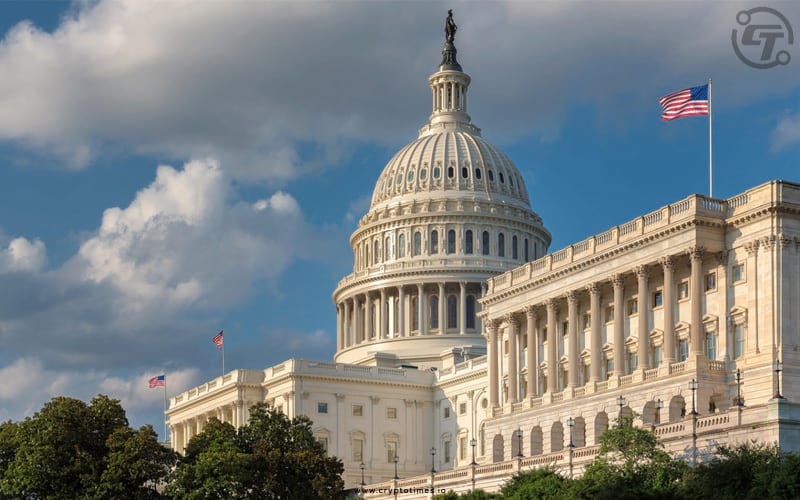U.S. Senators Mark Warner(D-Va.) and Krysten Sinema (D-Ariz) updated their amendment modifying crypto tax reporting provision in the Senate’s Landmark infrastructure bill. The new amendment to the infrastructure bill would lessen the burden on cryptocurrency tax reporting for miners and wallet providers.
As Perianne Boring reported the senators are endorsing an amendment that would exclude crypto miners and hardware and software wallet providers from being subject to new tax reporting provisions.
Senate deliberations continued over the weekend over a $1 trillion infrastructure bill, highlighting how the bill could impact the world of cryptocurrency. The Infrastructure bill allocates money to build roads, bridges, transportation systems, clean energy, among other developments. The bill includes tax provisions to raise about $28 billion for that $1 trillion packages through taxes from crypto transactions.
In Sunday’s Senate session Sen. Rob Portman(R-OH) said, “As we know, cryptocurrency is a digital asset that more and more people are investing in. And We should want that to continue, and continue in a healthy and sustainable way”. Portman proposed an amendment to the bill’s cryptocurrency tax provision to crackdown concerns over digital rights along with other senators.
New Amendment from Senators for The Crypto Brought Baklash
A series of final hour cryptocurrency-related amendments to the bill were proposed in the day leading up to Saturday’s vote. Ron Wyden(D.Ore), Pat Tommey (R.Pa). and Cynthia Lummis(R., Wyo)introduced an amendment to provide clarification into the term “Broker.”
The current version of the crypto reporting provision in the bill would broaden a definition of a “broker”. The bill classified a broker within the cryptocurrency industry that facilitates the transfers of digital currencies for another person. An initial version would broaden the exemption beyond just Proof-of-work validators. The second revision comes to only exempt Proof-of-work (POW) and Proof-of-stake (POS) validators. Brokers must also submit reports for any transactions over $10,000 to Internal Revenue Services(IRS), which already monitors.
Jerry Brito noted on Twitter that the amendment didn’t add protocol developers. He is an executive director of the crypto advocacy think tank coin center.
Tesla CEO Elon Musk and Cryptocummunity on Crypto Regulation
Elon Musk along with the crypto-community believes that the U.S. government picked winners in the crypto space. They chose a POW & POS consensus mechanism. There are lots of other consensuses too.
The Tesla CEO also responded to a thread on Twitter started by Coinbase CEO Brain Armstrong about the crypto tax amendment “that would decide which foundation technologies are OK and which are not in crypto,” Armstrong wrote. “This is disastrous.”
Elon Musk responded, “Agreed this is not the time to pick technology winners or losers in cryptocurrency technology.” He added, “There is no crisis that compels hasty regulation.”
Armstrong explained: “Senator Mark Warner has asked for proof of stake Validators to comply with the impossible, but not proof of work miners. Why? It’s not clear, but we could find ourselves with the Senate deciding which types of crypto will survive government regulations.”
Twitter CEO Jack Dorsey opposed Warner’s previous bill iteration, arguing that the “amendment makes it worse, especially for open source developers.”
Not to tie this information to an individual, but rather to the series of transactions that came before. The cryptocurrency marketplace does not easily allow for the collection and reporting of information on users. Twitter CEO weighed in on the current state of crypto discussions.
This week, following calls from advocates to tighten language around who should be legally required to report crypto transactions. The tax provision has met pushback from other digital rights advocates like non-profit Fight for the Futures. Supporters to call senators and encourage lawmakers to reconsider the crypto regulations.
The Supporters
White House press secretary Jen Psaki praised the Warner-Portman-Sinema amendment because the administration believes it “strikes the right balance and makes an important step forward in promoting tax compliance.”
The crack between supporters of the two amendments also led to a public rebuke of the Warner-Portman-Sinema amendment from Wyden-Loomis-Toomey amendment’s authors.
“While I appreciate that my colleagues and the White House have acknowledged their original crypto tax had flaws, the Warner-Portman amendment picks winners and losers based on the type of technology employed,” tweeted Toomey.
Additionally, the backlash came from cryptocurrency stakeholders like Square, Coinbase, and RibbitCapital, which are among entities. The US Senate had voted 68 in favour to 29 against ending the debate. 18 Republicans joined Democrats on the 67-27 vote to push the measure past a filibuster.
The Clif Hanging Outcome
In the end, Senate talks regarding the U.S. infrastructure bill ended without any amendments. The talk also suggested that the original bill will be voted on next Tuesday. However, the Senate could still pass an amendment to the bill by unanimous consent before the final vote.
According to a Twitter thread from Lummis, both sides are now at an impasse over the 30-hour rule. It allows senators to consider a bill for up to 30 hours before voting on it. While taking a shot at the opposite camp, Lummis wrote that some senators are too focused on passing the infrastructure bill quickly. In Naming Senator Schumer, Lummis adds that he also wants to quickly vote to focus on other legislation.
If the Senate passes the bill on Tuesday, the legislation would still need to clear the house before becoming law. It will give further opportunities for the crypto provisions to be revised.






